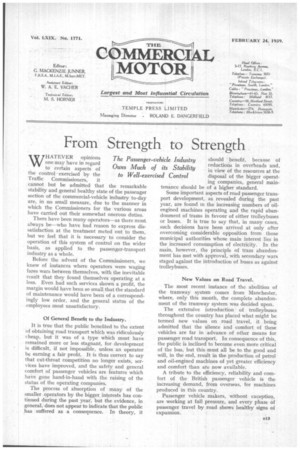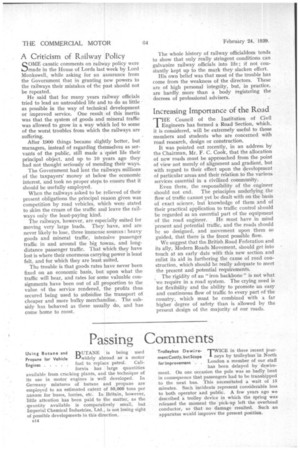From Strength to Strength
Page 55

Page 56

If you've noticed an error in this article please click here to report it so we can fix it.
WHATEV ER opinions one may have in regard to certain aspects of the control exercised by the Traffic Commissioners, it cannot but be admitted that the remarkable stability and general healthy state of the passenger section of the commercial-vehicle industry to-day are, in no small measure, due to the manner in which the Commissioners for the various areas have carried out their somewhat onerous duties.
There have been many operators—as there must always be—who have had reason to express dissatisfaction at the treatment meted out to them, but we feel that it is necessary to consider the operation of this system of control on the wider basis, as applied to the passenger-transport industry as a whole.
Before the advent of the Commissioners, we knew of instances where operators were waging fares wars between themselves, with the inevitable result that they found themselves operating at a loss. Even had such services shown a profit, the margin would have been so small that the standard of maintenance would have been of a correspondingly low order, and the general status of the employees most unsatisfactory.
Of General Benefit to the Industry.
It is true that the public benefited to the extent of obtaining road transport which was ridiculously cheap, but it was of a type which must have remained more or less stagnant, for development is difficult, if not impossible, unless an operator be earning a fair profit. It is thus correct to say that cut-throat competition no longer exists, services have improved, and the safety and general comfort of passenger vehicles are features which have gone hand-in-hand with the raising of the status of the operating companies.
The process of absorption of many of the smaller operators by the bigger interests has continued during the past year, but the evidence, in general, does not appear to indicate that the public has suffered as a consequence. In theory, it should benefit, because of reductions in overheads and, in view of the resources at the disposal of the bigger operating companies, general main tenance should be of a higher standard.
Some important aspects of road passenger transport development, as revealed during the past year, are found in the increasing numbers of oilengined machines operating and the rapid abandonment of trams in favour of either trolleybuses or buses. It is true to say that, in many cases, such decisions have been arrived at only after overcoming considerable opposition from those municipal authorities whose main interest lies in the increased consumption of electricity. In the main, however, the principle of tram abandonment has met with approval, with secondary wars staged against the introduction of buses as against trolleybuses.
New Values on Road Travel.
The most recent instance of the abolition of the tramway system comes from Manchester, where, only this month, the complete abandonment of the tramway system was decided upon.
The extensive introduction of trolleybuses throughout the country has placed what might be termed new values on road travel, it being admitted that the silence and comfort of these vehicles are far in advance of other means for passenger road transport. In consequence of this, the public is inclined to become even more critical of the bus, but this must all be to the good and will, in the end, result in the production of petrol and oil-engined machines of yet greater efficiency and comfort than are now available.
A tribute to the efficiency, reliability and comfort of the British passenger vehicle is the increasing demand, from overseas, for machines produced in this country.
Passenger vehicle makers, without exception, are working at full pressure, and every phase of passenger travel by road shows healthy signs of expansion.
A Criticism of Railway Policy
SOIVIE caustic comments on railway policy were made in the House of Lords last week by Lord Monkswell, while asking for an assurance from the Government that in granting new powers to the railways their mistakes of the past should not be repeated.
He said that for many years railway officials tried to lead an untroubled life and to do as little as possible in the way of technical development or improved service. One result of this inertia was that the system of goods and mineral traffic was allowed to grow in a way which led to some of the worst troubles from which the railways are suffering.
After 1900 things became slightly better, but managers, instead of regarding themselves as servants of the public, still made a quiet life their principal object, and up to 10 years ago they had not thought seriously of mending their ways.
The Government had lent the railways millions of the taxpayers' money at below the economic interest, and took no proper steps to ensure that it should be usefully employed.
When the railways asked to be relieved of their present obligations the principal reason given was competition by road vehicles, which were stated to skim the cream of the traffic and leave the railways only the least-paying kind.
The railways, however, are especially suited for moving very large loads. They have, and are never likely to lose, three immense sources : heavy goods and mineral traffic, intensive passenger traffic in and around the big towns, and longdistance passenger traffic. That which they have lost is where their enormous carrying power is least felt, and for which they are least suited.
The trouble is that goods rates have never been fixed on an economic basis, but upon what the traffic will bear, and rates for some valuable consignments have been out of all proportion to the value of the service rendered, the profits thus secured being used to subsidise the transport of cheaper and more bulky merchandise. The subsidy has behaved as these usually do, and has come home to roost. The whole history of railway officialdom tends to show that only really stringent conditions can galvanize railway officials into life ; if not constantly kept up to the mark they slacken effort.
His own belief was that most of the trouble has come from the weakness of the directors. These are of high personal integrity, but, in practice, are hardly more than a body registering the decrees of professional advisers.
Increasing Importance of the Road
THE Council of the Institution of Civil Engineers has formed a Road Section, which, it is considered, will be extremely useful to those members and students who are concerned with road research, design or construction.
It was pointed out recently, in an address by the Chairman, Mr. F. C. Cook, that the allocation of new roads must be approached from the point of view not merely of alignment and gradient, but with regard to their effect upon the development of particular areas and their relation to the various services essential in a civilized community.
Even there, the responsibility of the engineer should not end. The principles underlying the flow of traffic cannot yet be dealt with on the basis of exact science, but knowledge of them and of their practical application to traffic control should be regarded as an essential part of the equipment of the road engineer. He must have in mind present and potential traffic, and the roads should be so designed, and movement upon them so guided, that there is the freest possible flow.
We suggest that the British Road Federation and its ally, Modern Roads Movement, should get into touch at an early date with this new section and enlist its aid in furthering the cause of road construction, which should be really adequate to meet the present and potential requirements.
The rigidity of an "iron backbone" is not what we require in a road system. The crying need is for flexibility and the ability to promote an easy and continuous flow of traffic to every part of the country, which must be combined with a far higher degree of safety than is allowed by the present design of the majority of our roads.












































































































































